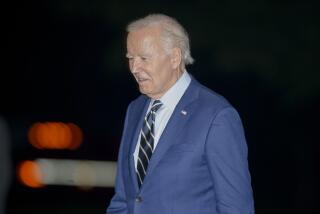Israeli Premier Hews to Hard Line in His Meeting With Christopher
- Share via
JERUSALEM — In his first meeting with Secretary of State Warren Christopher since becoming prime minister, Benjamin Netanyahu on Tuesday hewed to a hard line on Palestinian autonomy and insisted that Israel’s security takes precedence over peacemaking with its neighbors.
“The people want peace with security,” said Netanyahu, the leader of the right-wing Likud Party. “We have secured a clear mandate from the people.”
At a session intended to lay the groundwork for a new U.S.-Israeli relationship, Netanyahu declined to reaffirm Israel’s earlier plans to withdraw troops from the West Bank town of Hebron, as U.S. officials have urged. Instead, he cited the “complexities” of the issue.
Although the Israeli leader may prove more flexible at a July 9 meeting in Washington with President Clinton, Tuesday’s session appeared to be a disappointment for Christopher, who is on his 21st trip to the region.
Netanyahu, who defeated dovish Prime Minister Shimon Peres by a razor-thin margin in last month’s election, echoed his campaign pledges without elaboration, despite the widespread belief that he must begin fleshing out his intentions if the peace effort is to move ahead.
A Netanyahu aide, however, said Israeli officials were delighted with the meetings. Christopher offered strong U.S. support and did not put conditions on it, the aide said.
In his first formal news conference since the election, Netanyahu did not mention the “land for peace” negotiating principle that had guided his predecessor Labor Party governments in the peace process.
But he repeated his frequent declaration that he is eager to resume negotiations with neighboring Arab nations without “preconditions.”
“We intend to resume negotiations with Syria, with Lebanon and with other Arab states,” he said. “We believe that the principle that should guide these negotiations is ‘no prior conditions.’ ”
He said his government wants to “preserve” the achievements of the peace process “and to broaden them as well.”
Responding to Christopher’s call for better communications with Palestinian leaders, he vowed, “There’ll be no shortage of communications channels, and we’ll broaden the communications.”
Palestinian officials have complained about their level of access to Netanyahu’s government.
But the Israeli leader showed no sign of yielding on the issue of Hebron. Peres had promised to pull most Israeli troops out of the city but postponed the move after a series of suicide bombings in February and March.
“We are studying the question of Hebron in all of its complexities--historical complexity, religious complexity, security complexity of the highest order,” he said, mentioning the risks of violence in the city, where about 400 Jewish settlers live among 100,000 Palestinians.
At the news conference, Christopher’s comments were muted on an issue about which the U.S. government has been highly outspoken in the past: the growth of Jewish settlements in the West Bank. Washington once went so far as to threaten the withdrawal of U.S. loan guarantees if the Israeli government didn’t halt expansion of the settlements.
But when asked if he had delivered a strong message on the subject, Christopher demurred. He said he didn’t want to get into specifics on a trip that he said was intended primarily to review the history of the peace process with Netanyahu and plan for the July meeting.
One political observer said Christopher was taking an accommodating tone to avoid an escalation of rhetoric of the kind that already appears to be shaping up between the Netanyahu government and some Arab leaders.
“There’s a danger of getting into an . . . escalation before anybody does anything at all,” said Mark Heller, political scientist with the Jaffee Center for Strategic Studies at Tel Aviv University.
Christopher is scheduled to meet with Egyptian President Hosni Mubarak in Cairo today to review the Arab summit held there last weekend--a meeting at which the leaders hinted they might rethink relations with Israel if it does not adhere to the “land for peace” principle. Christopher will also confer in Egypt with Palestinian leader Yasser Arafat before flying to Lyons, France, for a summit of the Group of 7 industrialized nations.
Times staff writer Marjorie Miller in Jerusalem contributed to this report.
More to Read
Sign up for Essential California
The most important California stories and recommendations in your inbox every morning.
You may occasionally receive promotional content from the Los Angeles Times.











